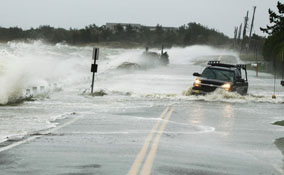
State Farm, Progressive, New Jersey Manufacturers and Nationwide are reporting roughly 31,000 car-damage claims associated to flood-damaged cars from Hurricane Sandy. This doesn't include claims numbers from other large insurers, such as Farmers, Allstate, Geico, Liberty Mutual and USAA, who haven’t release claims information from the storm yet. Regardless it’s a far cry from the claim the number of cars damaged by Sandy could be larger than when Hurricane Katrina hit the Gulf Coast in 2005 and marred more than 600,000 vehicles.
If you are one of the few affected by storm damage from the Hurricane Sandy it’s important to understand what you vehicle was worth prior to the hurricane damage. If it was insured you’re mostly likely entitled to quite a bit more than the insurance company is offering you on your claim.
What can you do?
Estimate what your car was worth using a value guide such as NADA, Kelly Blue Book or Edmunds. These value guides cannot tell you exactly what your car is worth, but for the purpose of determining if you’re getting a fair offer it’s a great start.
The Insurance company is running a business, you have a contract with them to either replace or repair you vehicle should you have a claim. In the case of a total loss, they have close to replace your vehicle and will offer you a settlement that in theory will be enough for you to purchase a replacement vehicle.
Insurance claims adjusters have settlement range and will typically begin at the lowest figure. Their job is to settle the claim for the least possible amount of money. Know what your vehicle was worth by using the value guide to determine what vehicles like yours are worth based on its options and mileage. Don’t be afraid to reject the first offer if it doesn't even meet the average value guide value.
Show the Insurance Company you have data that says your car is worth more than they are offering. Present them with value guide data and comparable vehicles. If they will not offer a fair settlement, within your automobile policy, you have the right to dispute the value they offer and present them with your own valuation. The process is defined in your automobile policy as the Appraisal Clause.
Contact your local Auto Appraisal Network appraiser and talk to them about determining what your vehicle was worth and discuss the claims process to determine if you getting a fair offer or if your leaving money on the table.
Don’t forget that flood damaged cars may not have any issues until that water has had a chance to damage your car. Salt water is more corrosive than fresh water and the damage may not be apparent for several years.

 To request an appraisal, please complete the sections below:
To request an appraisal, please complete the sections below: